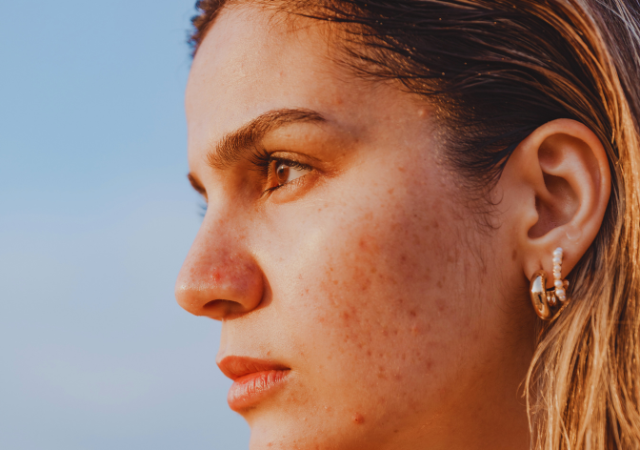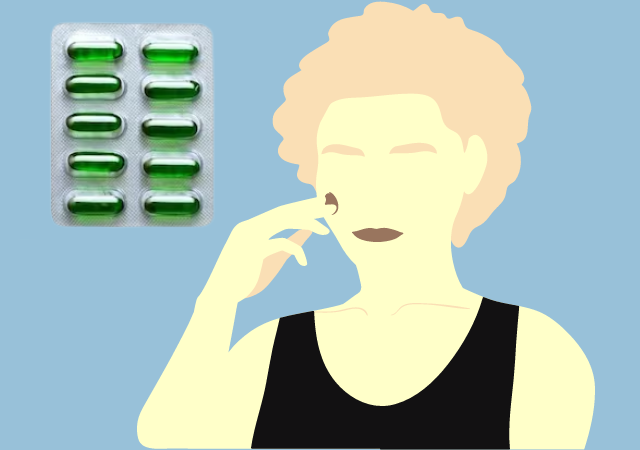Is a Vitamin E Capsule Good for Oily Skin?
Introduction
Achieving healthy, glowing skin is a universal aspiration, but the path to flawless skin can be a winding journey, especially for those with oily complexions. Oily skin often leads to persistent challenges such as excess shine, enlarged pores, and an increased risk of breakouts. Amidst the myriad of skincare solutions, one question looms large: Can a humble Vitamin E capsule be the secret to conquering oily skin woes?
In this article, we delve into the intriguing world of skincare and explore the potential benefits of Vitamin E capsules for individuals grappling with oily skin. Vitamin E, celebrated for its antioxidant properties and skin-nourishing potential, has long been a favorite in the beauty industry. But does it hold the key to a shine-free, radiant complexion for those with oily skin? We’ll unravel the science, examine real-life experiences, and offer practical advice on how to incorporate Vitamin E capsules into your skincare routine.
If you’re on a quest for a skincare savior that could transform your oily skin into a radiant canvas, read on to discover whether Vitamin E capsules might just be the answer you’ve been seeking.
-
Understanding Oily Skin

Before delving into the specific use of Vitamin E capsules, it’s essential to grasp the characteristics and challenges associated with oily skin. Oily skin is primarily characterized by overactive sebaceous glands that produce excess sebum, the skin’s natural oil. This excess oil can lead to several common issues, including:
- Shine: Oily skin often appears shiny and greasy, particularly in the T-zone (forehead, nose, and chin).
- Enlarged Pores: The excess sebum can cause pores to become enlarged and more noticeable.
- Acne: Oily skin is more prone to acne because the excess oil can clog pores, leading to blackheads, whiteheads, and pimples.
- Uneven Texture: Oily skin can sometimes have an uneven texture due to the presence of acne and enlarged pores.
- Makeup Challenges: Makeup may struggle to stay in place on oily skin, often requiring frequent touch-ups.
Given these challenges, individuals with oily skin are constantly seeking ways to manage and improve their skin condition. This is where Vitamin E comes into play.
-
Vitamin E: An Overview

What is Vitamin E?
Vitamin E is a fat-soluble antioxidant that is naturally found in various foods, including nuts, seeds, spinach, and vegetable oils. It is renowned for its potential health benefits, including its role in promoting healthy skin.
Role of Vitamin E in Skincare
Vitamin E has been a darling of the skincare industry for many years, primarily due to its antioxidant properties. Antioxidants help protect the skin from the damaging effects of free radicals, unstable molecules that can accelerate the aging process and contribute to various skin issues, including wrinkles and sun damage.
Vitamin E is also known for its moisturizing properties. It can help maintain the skin’s natural moisture balance, making it an attractive option for those with dry or dehydrated skin.
Additionally, Vitamin E is believed to have anti-inflammatory properties, which can be beneficial for individuals with sensitive or irritated skin.
-
Vitamin E and Oily Skin

Now that we’ve established the fundamentals of oily skin and Vitamin E, let’s explore whether Vitamin E capsules can be a good fit for those with this skin type.
Can Vitamin E Capsules Be Used for Oily Skin?
The use of Vitamin E capsules for oily skin is a topic of debate among skincare enthusiasts and professionals. While Vitamin E does offer various benefits for the skin, whether it is suitable for oily skin depends on several factors.
The Science Behind Vitamin E’s Impact on Oily Skin
- Antioxidant Properties: Vitamin E’s antioxidant properties can potentially benefit oily skin by protecting it from oxidative stress. Oily skin is not immune to free radical damage, and antioxidants can help mitigate the effects of environmental pollutants and UV radiation.
- Moisturizing Effect: Vitamin E’s moisturizing properties may seem counterintuitive for oily skin. However, it’s essential to remember that oily skin can still suffer from dehydration, which can lead to an overproduction of oil as the skin tries to compensate. By providing hydration, Vitamin E may help balance the skin’s oil production.
- Anti-Inflammatory Potential: Oily skin is often associated with inflammation, especially when dealing with acne. Vitamin E’s anti-inflammatory properties may assist in calming redness and irritation associated with breakouts.
-
Potential Benefits of Using Vitamin E for Oily Skin

While the suitability of Vitamin E capsules for oily skin may vary from person to person, here are some potential benefits:
- Balancing Oil Production: Vitamin E may help regulate sebum production, reducing excessive oiliness without over-drying the skin.
- Reducing Inflammation: Its anti-inflammatory properties can assist in managing the redness and irritation that often accompany acne.
- Scar Healing: For those with acne-prone oily skin, Vitamin E’s ability to promote skin healing may help minimize the appearance of acne scars.
- Protection from Environmental Damage: Vitamin E can act as a shield against environmental aggressors, helping oily skin maintain its health and vitality.
- Hydration without Clogging Pores: Unlike some heavy moisturizers, Vitamin E is generally non-comedogenic, meaning it’s less likely to clog pores while providing necessary hydration.
However, it’s crucial to approach the use of Vitamin E capsules with caution, as there are potential side effects and considerations to keep in mind.
-
How to Use Vitamin E Capsules for Oily Skin
If you decide to incorporate Vitamin E capsules into your skincare routine, it’s essential to do so properly. Here are some steps and precautions to consider:
Steps to Incorporate Vitamin E Capsules:
- Choose the Right Product: Look for pure Vitamin E capsules or oils without added ingredients like fragrances or preservatives. These can potentially irritate the skin.
- Patch Test: Before applying Vitamin E to your entire face, conduct a patch test on a small area of your skin to ensure you don’t have an adverse reaction.
- Cleanse Your Face: Start with a clean face to ensure that the Vitamin E is applied to a clean canvas.
- Pierce the Capsule: Gently pierce a Vitamin E capsule with a sterile needle or pin and squeeze out the oil.
- Apply Sparingly: A little goes a long way. Use a small amount of Vitamin E oil and gently massage it into your skin. Focus on areas prone to excess oil, avoiding the eye area.
- Allow Absorption: Let the oil absorb into your skin for a few minutes before applying any other skincare products or makeup.
- Use Sparingly: Vitamin E is potent, so use it sparingly – perhaps a few times a week initially – and observe how your skin reacts.
-
Precautions and Considerations When Using Vitamin E Capsules:

- Potential Allergies: Some individuals may be allergic to Vitamin E. If you experience itching, redness, or hives after using it, discontinue use and consult a dermatologist.
- Acne-Prone Skin: While Vitamin E can be beneficial for many with oily skin, it’s not a one-size-fits-all solution. Those with severe acne should consult a dermatologist for a personalized approach.
- Sun Protection: Vitamin E can enhance the effectiveness of sunscreens, but it’s not a substitute for sunscreen. Continue using sunscreen daily, especially when using Vitamin E products.
- Consistency: Results from using Vitamin E may not be immediate. Consistency in your skincare routine is key to seeing potential benefits.
- Individual Variability: What works for one person may not work for another. It’s essential to monitor your skin’s response and adjust your routine accordingly.
- Consult a Dermatologist: If you have concerns about using Vitamin E capsules for your oily skin, it’s advisable to consult a dermatologist. They can provide personalized recommendations based on your skin type and specific needs.
-
Potential Side Effects and Allergies

While Vitamin E is generally considered safe for topical use, it’s essential to be aware of potential side effects and allergies. Common side effects may include:
- Skin Irritation: Some individuals may experience skin irritation, itching, or redness when using Vitamin E capsules. This is more likely if the product contains additional ingredients that your skin may be sensitive to.
- Acne Breakouts: In rare cases, Vitamin E oil may cause breakouts or worsen existing acne. If this occurs, discontinue use.
- Allergic Reactions: Allergic reactions to Vitamin E are rare but can happen. If you notice swelling, hives, or difficulty breathing, seek medical attention immediately.
It’s crucial to emphasize that not everyone will experience these side effects, and many individuals with oily skin have successfully incorporated Vitamin E into their skincare routines without issue.
-
Other Skincare Tips for Oily Skin
While Vitamin E capsules may offer potential benefits, they are just one piece of the puzzle when it comes to managing oily skin. Here are some additional skincare tips to complement your routine:
1. Cleansing: Use a gentle, sulfate-free cleanser twice daily to remove excess oil and impurities without stripping the skin of essential moisture.
2. Exfoliation: Regular exfoliation can help unclog pores and improve skin texture. Opt for a salicylic acid or glycolic acid-based exfoliant.
3. Oil-Free Products: Choose oil-free or non-comedogenic moisturizers, sunscreen, and makeup products to avoid exacerbating oiliness.
4. Hydration: Oily skin still needs hydration. Look for lightweight, hydrating serums and water-based moisturizers.
5. Diet and Hydration: Maintain a balanced diet rich in fruits and vegetables and stay well-hydrated to support overall skin health.
6. Sun Protection: Always wear sunscreen with broad-spectrum protection, even on cloudy days. UV radiation can exacerbate oily skin and cause premature aging.
7. Hands Off: Avoid touching your face, as this can transfer dirt and oil from your hands to your skin.
-
Real-Life Experiences and Testimonials
To provide a more comprehensive view of the potential benefits and drawbacks of using Vitamin E capsules for oily skin, let’s explore some real-life experiences and testimonials from individuals who have tried this approach:
Positive Experiences:
-
- Mahek: “I’ve been using Vitamin E capsules as part of my nighttime routine for a few months now, and my skin has never looked better. It’s less oily during the day, and I’ve noticed fewer breakouts.”
- Rohit: “I was hesitant at first, but Vitamin E capsules have helped reduce the redness and irritation from my acne. My skin looks more balanced and less greasy.”
Negative Experiences:
-
- Dipesh: “I tried using Vitamin E oil, and it caused breakouts like never before. My skin felt heavy and congested. It wasn’t the right fit for my oily skin.”
- Sunny: “I developed an itchy rash after using Vitamin E capsules. Turns out, I’m allergic to it. It was a disappointing experience.”
These testimonials underscore the variability of results and the importance of personalized skincare routines. What works for one person may not work for another, and individual skin types and sensitivities play a significant role.
Conclusion (Is a Vitamin E Capsule Good for Oily Skin?)
In the pursuit of healthy, radiant skin, exploring new skincare remedies is an ongoing endeavor. Vitamin E capsules have garnered attention for their potential benefits, particularly for those with oily skin. While they offer antioxidant protection, moisturization, and anti-inflammatory properties, their suitability for oily skin is not a one-size-fits-all solution.
The decision to incorporate Vitamin E capsules into your skincare routine should be made with care and consideration. Always perform a patch test, start with a minimal amount, and closely monitor your skin’s reaction. If you experience any adverse effects or are uncertain about the best approach for your skin type, consult a dermatologist for personalized guidance.
Ultimately, whether Vitamin E capsules are good for oily skin depends on your individual skin needs and preferences. While they may hold promise for some, they may not be the holy grail solution for others. Remember that skincare is a journey of trial and error, and the key to success lies in finding the regimen that works best for you.

My name is Rohit Vagh and I’m a content writer specializing in fashion and lifestyle. I have three years of experience in this field and have written various articles. My writing style is creative and engaging, and I strive to create content that resonates with my readers. I have a deep passion for fashion and am constantly researching the latest trends and styles to make sure my readers are up to date. I’m excited to continue my career in blogging, and I’m always looking for new opportunities in the fashion and lifestyle space.





